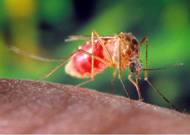|
"Your gateway to
understanding |
West Nile Virus (WNV)

- Mosquito-borne infection that can be passed to humans
- When humans are infected, symptoms are rare
- People over 50 are at greatest risk of serious infection
West Nile virus is a mosquito-borne infection, known as an arbovirus, which can cause infections in animals and humans. It is considered a seasonal epidemic in North America because it occurs mainly in the summer, but it may still be present in early fall. It is not contagious by touch, but can be spread by infected mosquitoes, transfusions, transplants, or from mother to child during pregnancy. West Nile was first confirmed in New York State in 1999, and since 2000 there have been over 193 human cases reported statewide. In 2001, spraying was conducted in both Oneida and Onondaga counties due to positive test results in captured mosquitoes. In 2003, 10 dead birds were found to be infected with WNV in Oneida County and 36 were found in Onondaga County.
The chances of a person becoming ill with West Nile virus are small, and most people who are infected do not show any sign of illness. In mild cases of infection, called West Nile fever, individuals may experience headaches, body aches, fevers, and occasional skin rashes and swollen lymph glands. However, the New York State Department of Health estimates that just 20% of infected individuals will develop West Nile fever, and many individuals have symptoms so mild that they go unnoticed or undetected.
In severe cases of West Nile virus infections, individuals may develop West Nile encephalitis or meningitis (inflammations of the spinal cord and brain). These infections are characterized by symptoms that include headache, high fever, neck stiffness, muscle weakness, stupor, disorientation, tremors, convulsions, paralysis, coma, and even death. It is estimated that one in 150 people infected with the West Nile virus will develop the more severe form of the disease, and people over 50 are at greatest risk.
Mosquito-bite prevention is the most effective way to reduce the risk of mosquito-borne diseases such as West Nile virus. To stay protected from mosquitoes and West Nile virus, wear long sleeves, pants and socks. Insect repellent is a good idea for exposed skin, as repellents can be effective at reducing bites from insects that transmit disease. Product label directions should be followed, as repellents applied in large amounts or applied improperly may cause health problems.
To learn more about WNV ...
